Dental Implants Brenham
Moving Beyond the Gumline to Restore Oral Health
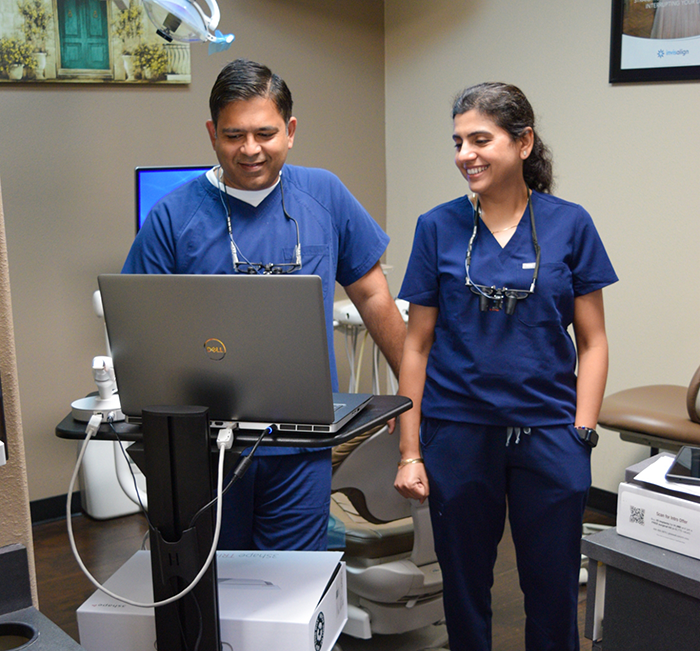
While traditional forms of tooth replacement only rebuild the visible portions of missing teeth, dental implants move beyond the gumline to fully restore a person’s oral health. At Smile Keepers, we believe in the effectiveness and benefits of these permanent prosthetics, offering both traditional dental implants and All-On-X. Our team performs the placement and restoration process in-house for added convenience, so if you are ready to find out whether you are a good candidate for dental implants in Brenham, don’t hesitate to call our office to schedule a consultation.
Why Choose Smile Keepers for Dental Implants?
- Traditional Dental Implants & All-On-X Available
- Start-to-Finish Dental Implants in One Convenient Location
- Flexible Dental Financing to Lower Out-of-Pocket Costs
What Are Dental Implants?
A dental implant has three parts – the titanium post, a metal abutment, and the custom restoration (i.e., crown, bridge, or denture). The post is placed into a designated area of the jawbone and fuses over time to the surrounding tissues, creating a strong base for the rest of your smile. The metal abutment is then attached to the post before your artificial tooth (or teeth) are secured on top. With dental implants, you never need to worry about your teeth slipping or following certain food restrictions. They look and function just like natural teeth and minimize the potential for facial sagging because of the continuous stimulation they deliver to your jawbone over time.
The 4-Step Dental Implant Process
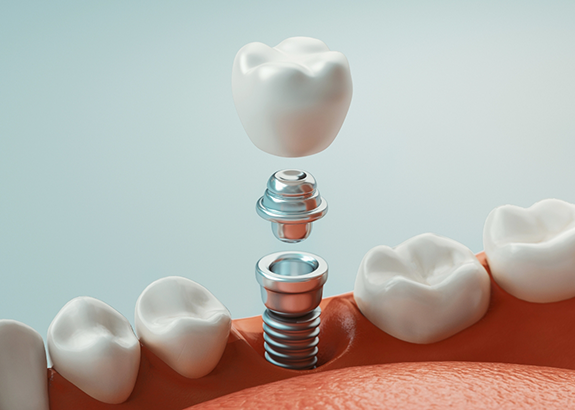
Dental implant placement is a multi-step process that cannot be completed overnight. It requires time and patience to rebuild a strong and whole smile, and each phase must be successful before moving on to the next. From start to finish, the entire process may take several months or longer. As you will see below, we have provided a more thorough explanation of what you can expect along the way, but if you have any questions, make sure to call our office.
Initial Dental Implant Consultation

You will meet with one of our esteemed implant dentists in Brenham, who will take detailed images of your mouth and head before conducting a visual examination of your oral anatomy. Using this information, we will decide if additional treatment is necessary before moving forward with dental implant surgery. For example, you might require a bone graft or gum disease therapy.
This initial appointment is an excellent opportunity to ask any questions that you may have about the road ahead. We can also review financial information with you so you have a realistic idea of how the treatment might affect your budget.
Dental Implant Surgery
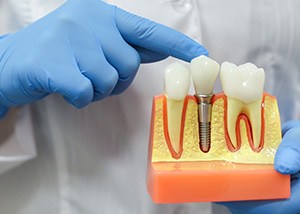
Once you are cleared to receive dental implants, you will undergo the placement surgery. Our dental team has all the skills and equipment necessary to perform this delicate procedure in-house, so there is no need to worry about visiting an outside specialist.
The procedure itself is fairly straightforward. First, we will administer local anesthesia and possibly sedation. Then, we will place each implant post into its corresponding spot in your jawbone. Once that is done, we will close the gum tissue so you can start your recovery process. Most patients feel well enough to return to work within a day or two of their procedure.
Dental Implant Osseointegration & Abutment Placement
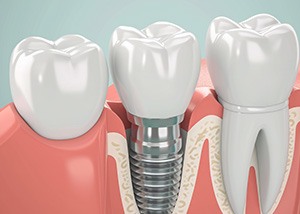
Over a period of 4 - 6 months, your implants will fuse with your jawbone tissues via osseointegration. This biological process is vital because it allows the implants to provide a sturdy base for your prosthetic teeth. Throughout the period of osseointegration, it is important to follow all necessary instructions so that no complications occur.
After adequate osseointegration has occurred, you will come back to our office to have metal abutments placed over your posts. This involves a second minor surgery. (Some patients receive abutments during their initial placement surgery, so this second procedure is not always necessary.)
Delivery of Dental Implant Restorations

Once your mouth is fully healed from surgery and abutment placement, we will start the restoration phase of your treatment. Our team will take detailed impressions of your mouth and use them as the basis for designing your new crown, bridge, or denture. After a laboratory fabricates it, you will receive your custom-made restoration. These artificial teeth will attach to the top(s) of your implants and remain securely in place so that you can begin to eat, speak, smile, and enjoy life like never before.
Benefits of Dental Implants

With over half a million dental implants placed each year, these durable prosthetics are quickly becoming one of the most popular and reliable ways to replace lost teeth. Because of their unique placement inside the jawbone, this modern restoration option boasts a variety of important benefits that you simply can’t get with dentures and bridges. Dental implants have the potential to dramatically improve your confidence, health, and overall quality of life!
Day-to-Day Benefits

Dental implants offer a variety of benefits that you can enjoy every single day, including:
- The ability to eat all your favorite foods, even ones you couldn’t enjoy with dentures.
- Convenient and easy care. Just brush and floss as you would your natural teeth.
- The ability to smile with confidence without the fear of your prosthetics slipping or coming out when you eat or speak.
Health Benefits

In addition to the many ways dental implants can simplify your life and bring back the confidence you once had with your complete smile, they also offer many important health benefits, too. These include:
- The ability to help you maintain a healthy and strong jawbone.
- Necessary stimulation to protect your remaining surrounding teeth.
- The restored ability to enjoy a nutritious diet.
- No tooth sensitivity or gum sores such as those common with dentures and dental bridges.
- Easier maintenance and care mean better oral health and a reduced risk of overall health problems.
Long-Term Benefits

Finally, your new dental implants also offer a variety of long-term benefits you may not have considered, such as:
- A 95% success rate even ten years after implantation.
- No need to replace your prosthetics every five to ten years like dental bridges and dentures.
- Potential cost savings over time versus other prosthetics
Who Dental Implants Can Help

If you’re struggling with tooth loss, then you know first-hand how difficult it is to smile confidently, chew properly, and enunciate clearly without a complete smile. Don’t worry – that’s where dental implants come in. This cutting-edge treatment can replace any number of missing teeth, and it can last for 30+ years with the proper care and maintenance. If you are interested in finding out if you’re a good candidate, then schedule a consultation with us or keep reading to learn more!
Who Is a Good Candidate for Dental Implants?

There are several qualities we look for in a good dental implant candidate, including a strong jawbone, healthy gums, and a willingness to break bad habits, like smoking. With that said, if we find an infection in your gums during your exam or you haven’t been able to successfully quit smoking in the past, don’t let that stop you from scheduling a consultation with one of our talented dental implant dentists in Brenham. That way, they can learn a little more about your unique dental history, needs, and goals to determine if this is still the best tooth-replacement solution for you.
Missing One Tooth
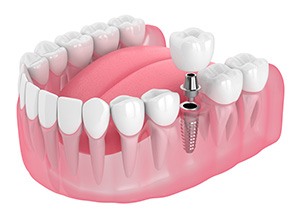
If you recently lost a tooth, we may recommend a single dental implant. If that’s the case, then we will insert the implant into your jawbone and allow time for the two to fuse together (a process known as osseointegration). Then, we can secure a custom-made dental crown on top to effectively restore the visible structure of your tooth as well.
Missing Multiple Teeth
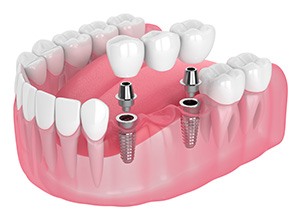
If you are missing multiple teeth, we can replace each tooth with a single dental implant. However, that’s usually not the most efficient or cost-effective option. If you are missing several teeth consecutively, then we can place a dental implant on each side of the gap and secure a dental bridge on top. Not only does this provide additional stability and durability, but it also means that the healthy teeth surrounding the gap won’t need to be altered!
Missing All Teeth
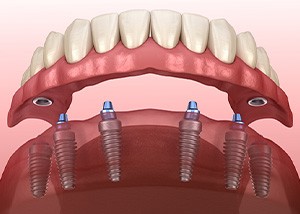
For traditional dental implants to succeed, they need a dense jawbone to help hold them in place. For many patients, this component is not possible, which means a bone graft is required. To avoid adding another procedure to an already complex process, we can provide an alternative that is just as effective as regular dental implants – All-On-X. With this solution, we can position 4-6 titanium posts in strategically placed areas of the jawbone and attach a custom-made denture on top. This produces a stable and long-lasting smile that looks natural and offers optimal function and durability.
Understanding The Cost of Dental Implants

Because you can replace one or more teeth with dental implants, this treatment is highly customizable to your individual needs. As a result, prices can vary dramatically. At Smile Keepers, we want you to feel confident in your decision, so we’ll always be up front about the cost of your treatment before it begins.
Our team in Brenham will do our best to ensure that your treatment is as affordable as possible, including maximizing your insurance benefits and assisting you in filing claims and applying for third-party financing.
Though dental implants are more expensive than other tooth replacement options, their benefits are well worth the investment because they are likely to last you a lifetime. This means they will be the most cost-effective option in the long term.
Preliminary Treatments & Dental Implant Surgery

Preliminary treatments such as gum disease therapy, tooth extractions, and bone grafting will add to the total cost of your dental implant treatment. While these preliminary procedures do make your treatment more expensive, they are vitally important to the success of your new smile. The good news is that many of them are partially covered by some dental insurance plans.
Dental implant surgery incurs its own cost and can vary depending on where your implants are placed in the jaw as well as what type of sedation or anesthesia you need.
Because your implant dentist is based right here at Smile Keepers, we can conveniently provide the entire dental implant treatment right here in our Brenham office, so you won’t need to worry about working with an outside surgeon or dividing payment between providers.
The Parts of Your Dental Implant
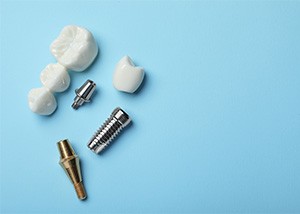
Another set of factors that determines the cost of your treatment are the number and type of your dental implants. For example, one dental implant for one missing tooth will cost less than four to six dental implants for an implant denture, but an implant denture will cost less than replacing each tooth individually.
The type of crowns you choose also affects your treatment cost. A crown, bridge, and denture all have different prices. The smaller they are, the less expensive they will be.
The size and material of your implant also matters. Some posts are longer than others depending on where they need to be placed in your jawbone, and the materials will also affect the cost, as some are made of titanium while others are made of zirconia.
Finally, the brand of your dental implants will also influence the price. Different manufactures make different types of implants to cater to the unique needs of patients. Your dentist can explain these differences and recommend an excellent option for your individual mouth.
How Dental Implants Pay for Themselves
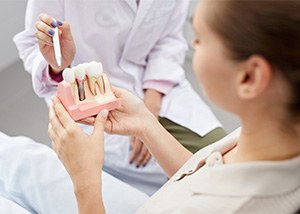
When it comes time to replace missing teeth, many patients are tempted to choose dentures or bridges because of their lower up-front cost. However, the one-time price of dental implants could be more cost-effective in the long term. That’s because unlike with bridges and dentures, you won’t need to replace your dental implants every five to ten years, nor will you need to buy any special pastes, soaks, or adhesives to maintain them.
Best of all, because your dental implants are easy to care for and won’t wear down your teeth or cause gum irritation, they can even help you prevent issues like gum disease, tooth decay and jawbone deterioration, as well as the associated costs with treating them. Studies have even shown that good oral health can help lower your risk of many systemic issues and their related costs, too.
Does My Dental Insurance Cover Dental Implants?

Dental insurance does not typically cover the cost of dental implants; however, there are some exceptions. Our team will happily review the details of your dental insurance plan. We have many years of experience maximizing insurance benefits, and if there is a way for a portion of your treatment to be covered, we can easily identify it. Often, a percentage of your final restoration or preliminary treatments may qualify.
Making Dental Implants Affordable

In addition to being in-network with a variety of dental insurance plans, at Smile Keepers we also gladly accept financing through several trusted third-party financiers, including:
- CareCredit
- Alphaeon
- Lending Club
- Cherry
- Proceed Finance
To learn more about these options and to verify insurance coverage, please contact our office for assistance. We can’t wait to get started on your beautiful new smile!
Maintaining & Caring for Your Dental Implants

Dental implants are considered the best form of tooth replacement for several reasons, one of which is their impressive longevity. They are designed to last a lifetime! Of course, they will only live up to that potential if they receive proper care. How can you take excellent care of your prosthetic teeth? Continue reading below to find some useful tips.
Make Oral Hygiene a Priority

Even though your dental implants are invulnerable to cavities, you still need to practice great dental hygiene. Otherwise, oral bacteria could lead to issues like gum disease and peri-implantitis (a leading cause of dental implant failure). Brush your teeth twice a day and floss daily to keep your mouth clean. You can also use an antibacterial mouthwash to reduce bacteria. Depending on the type of dental implant restoration you have, you might need to use a water flosser or floss threader to clean beneath it.
Eat a Healthy Diet

Dental implants can equip you to eat virtually any food, so feel free to enjoy all of your favorite treats, snacks, and meals. However, beware of overconsuming hard, sticky, or sugary foods, which might damage your implants or lead to bacterial buildup. Instead, choose foods rich in calcium, vitamin C, and other beneficial nutrients that can help you maintain a strong jawbone and healthy gum tissues. Ask our team if you would like specific tips on how to eat for oral health.
Break Bad Habits

Certain bad habits can cause your dental implants to break or fail. Smoking is especially harmful because it slows down your body’s healing process and increases the risk of infection in the mouth. Additionally, avoid using your teeth as tools to open packages or bite into hard objects like ice or pens, since these behaviors can put undue stress on your implants and potentially lead to cracks or fractures.
Protect Your Dental Implants
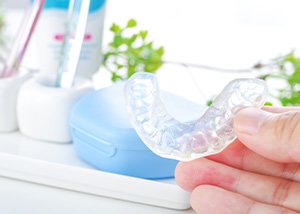
Although dental implants are remarkably durable, they are not indestructible. If you play sports, wearing a mouthguard can protect your implants from impacts and reduce the risk of damage. Choose a custom mouthguard rather than an over-the-counter product for optimal protection.
If you tend to grind your teeth at night, using a nightguard can place a protective barrier between your upper and lower arches. It can thereby prevent excessive wear and tear on both the implants and surrounding teeth.
Schedule Regular Dental Visits

Scheduling regular dental checkups is fundamental to the health and maintenance of your dental implants. It is recommended that you visit your dentist at least once every six months for routine checkups and professional cleanings. During these visits, your dentist will monitor the condition of your implants, checking for any signs of complications such as infection or damage. Professional cleanings will keep your implants free of plaque and bacteria that can lead to gum disease. You can also use these appointments as an opportunity to receive personalized guidance on how to keep your prosthetic teeth and natural oral tissues in great shape.
Dental Implant FAQs
Does getting dental implants hurt?
The procedure required for dental implant placement will not cause you to experience any pain. The reason is that you will receive local anesthesia, which is designed to numb various areas of your mouth so that you don’t experience any discomfort. However, you can expect there to be some soreness once the anesthesia wears off.
When returning home to recover, you will likely deal with some level of pain, but this can be minimized with over-the-counter pain relievers and cold compresses.
How successful are dental implants?
Dental implants in Brenham have a success rate of 95% upon initial placement. This number can remain almost the same even after 10 years of wear! Dental implants remain one of the most popular and worthwhile forms of tooth replacement available, leaving patients like yourself enjoying life with a stronger, healthier, and longer-lasting smile.
As long as you commit to taking proper care of your new teeth and avoiding unhealthy habits like smoking or chewing on inanimate objects, you can reap the benefits of these prosthetics for years to come.
What can cause dental implants to fail?
Since dental implants have a high success rate, the chances of failure remain slim. However, it’s not impossible for something to happen that causes complications. For example, if you smoke, your chances of implant failure drastically increase. The reason is that your immune system will weaken, making it harder for your body to heal. Also, if you suffer peri-implantitis – a form of gum disease – you may suffer implant failure because of the infection that exists around your new tooth.
This is why it’s essential that you maintain good oral hygiene and lifestyle habits so that your teeth will remain firmly in place for decades or a lifetime.
Will I have to take off work for dental implant surgery?
There is a good chance your implant dentist in Brenham will recommend that you take at least 1-2 days off work if you have a single tooth replaced. Giving your body the time it needs to rest and recover is important if you want to make sure that you can resume normal activity when expected.
If you need to have multiple dental implants or an entire of teeth replaced, you may want to ask off one full week to give yourself ample time to heal.
Will people be able to tell that I have dental implants?
No, you do not need to worry about others being able to tell that you have dental implants. The reason is that the titanium post is placed beneath the gumline, and the custom restoration will be crafted based on the size, shape, and color of your regular teeth. Once your new dental implants are in place, you’ll find that even you might have a hard time knowing which teeth are real and which ones are not.
